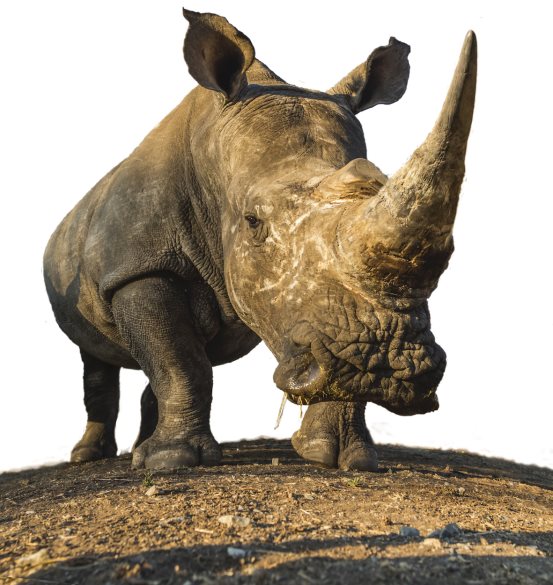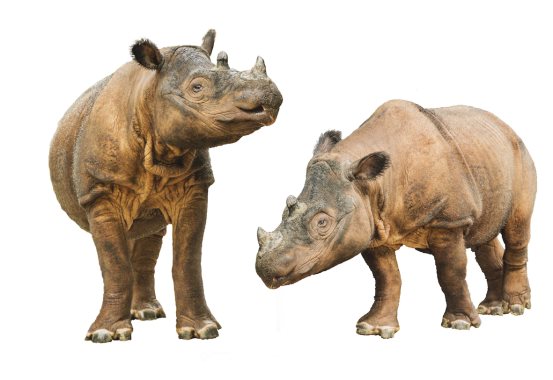
BIGGEST PUSH YET TO SAVE SURVIVING AFRICAN RHINOS LAUNCHED BY UNIVERSITY OF THE FREE STATE IN SOUTH AFRICA
UNTIL RECENTLY RHINOS WERE FOUND IN 22 AFRICAN COUNTRIES – NOW JUST FIVE COUNTRIES HAVE THEM
AND THE 35 REMAINING JAVAN RHINOS ARE A CHILLING WAKE UP CALL TO SAVE AFRICA’S RHINOS

A leading team of wildlife scientists and academics from the University of the Free State in South Africa are developing the biggest research programme yet dedicated to preserving rhinos for future generations.
Rhinos used to be found in 22 African countries just a few decades ago – now they are only left in five countries.
A group of researchers from the University of the Free State, coordinated by Dr Francois Deacon and Dr Willem Daffue from the Department of Animal, Wildlife and Grassland Sciences, have launched an interdisciplinary project last year. The focus of the project, with the title: Ecological and biological factors regulating rhino, is on establishing a conservation model through research and teaching which could be used as an example in other countries.
The team’s aim is to act proactively through a process of captivity and relocation in order to prolong the survival of this endangered species.
Dr Francois Deacon, asks: “So what is needed to ensure that there will be rhinos left in five to ten years’ time?” And he answers his question this way: “I and my fellow researchers are all dedicated to ensuring the survival of this species so that our children and grandchildren who have grown up in Africa will live to enjoy this spectacular mammal, one of the greatest in Africa. To make this happen we need knowledge yes, but we actually need the willingness from our own species to make the difference. The willingness to change the situation starts with us – humans!!
Data for the project will be collected from 750 rhino across South Africa to help build a future for rhino conservation and rhino farming practices. This project which the team has embarked on is the biggest of its kind ever to include a multidisciplinary approach on a global scale.
The Javan rhinoceros, of which there are only an estimated 35 left on the planet and only in Ujung Kulon National Park in Indonesia, is on the Red List of critically endangered species of the International Union for Conservation of Nature (IUCN). And these scientists and conservationist from this park will be in South Africa the next 2 weeks for meetings and discussions on the way forward.

JAVAN RHINO
In South Africa, however, the picture looks a bit brighter; there are an estimated 15, 000 – 18, 000 rhinos left, most of which are in captivity (private ownership and game farms) in an attempt to prevent further decline. But as recent history has shown, things can change fast. Even if breeding groups are reduced and not eliminated, there are risks of in-breeding that can side-line a species.
The University of the Free State is hosting a short colloquium lectures with the Indonesian guests responsible for the Java and Sumatra Rhinos.
Monday 26 August 2019 at 08:50 – 13:30 in the Albert Wessels Auditorium, UFS Campus in Bloemfontein
Little is known about the Java and Sumatra rhino’s, as they are shy, dense habitat living creatures. In comparison with their African family members who prefer open savannah plains, these two species respectively hide away in the forests of Java and Sumatra. Only a few determined environmentalists were able to capture footage of these two species. These efforts brought to light the dire circumstances in which these rhinos are struggling to survive. Due to an increase in deforestation, which affects the natural habitat, both these species are on the edge of extinction. It is estimated that only 35 Java rhinos and 65 Sumatra rhinos are left.
This is where the South African expertise come in. Driven by the passion for conservation and saving these two rhino species from extinction, experts from the University of the Free State have been roped in to share local rhino research, conservation, data capturing as well as rhino management practices.
Three guests from Indonesia, Dr Rudi Putra, a biologist, Mr Muhamnad Syamsudin, a conservationist, and Dr Firmanto Noviar Suwada, lead scientist on rhino observation data, are visiting the University of the Free State to collaborate with Dr Francois Deacon and Dr Willem Daffue and other key role players to investigate rhino management and conservation practices for possible duplication in Java and Sumatra. The international and local experts will team up for a two-week expedition with local key role players and stakeholders before departing to Java and Sumatra as an international collaboration effort to save these two species.
series facilitated by the world renown, Dr Willem Dafue. The panel members are Dr Rudi Putra, Mr Muhamnad Syamsudin, Dr Firmanto Noviar Suwada, Mr Syamsudin, and Dr Francois Deacon from the Faculty of Natural and Agricultural Sciences of the University of the Free State. This platform will create an opportunity for experts, both public and academic, to share experiences and ideas on conservation and research efforts, which can assist with the way forward in the battle to save the two rhino species of Java and Sumatra.
Qs & As
Q: How hopeful is Dr Francois Deacon about the success of this project in protecting and growing rhino numbers?
A: We need to rethink how we preserve rhino on the continent but also globally – their survival depends now on human decisions and very few rhino will be in extensive ecosystems. Our work will focus on optimising the rhino survival within human management systems, farming and ranching practices. Breeding programmes, DNA diversification, feeding requirements, home ranges and space, inter-calf periods, milk qualities, behaviour etc.
Q: How much funding do you have? Where is the funding coming from?
A: Currently we have no funding at all. We are self-sponsored and I and Willem Daffue are even paying the flight tickets, accommodation and meals for our Indonesian guests from our own pockets. We do this to build relationships and to start the ball rolling. We absolutely need urgent financial support – we are desperate, but as scientist we are hopeless at marketing ourselves, so we need a marketing intervention and a global platform to create this!
Q: Which academic disciplines are involved in this multi-disciplinary programme?
A: Linking collaborative efforts between departments are pivotal in trying to make a difference in rhino conservation. Multidisciplinary members representing the different departments on the UFS campus include: Animal, Wildlife and Grassland Sciences, Division of Virology, Zoology and Entomology, Department of Genetics, Biochemistry Division, Food Science Division, Microbiology Division and the SAENSE platform.
Universal aim for these team members will be to create a model for conservation via research and education to be used as an example for other countries. This model incorporate students, academia, professionals, sponsors and stakeholders that cover various topics relating to rhino education, management and conservation.
Prof Paul Grobler and Dr Karen Ehlers - Department of Genetics
Ms Rulien Grobler and Dr Errol Cason – Department of Animal, Wildlife and Grassland Sciences
Mr Hennie Butler - Department of Zoology and Entomology
Dr Frans O’Neill - Department of Virology and Microbiology
Prof Gary Osthoff – Department of Biochemistry and Food Science
Q. How long with the research take until a workable model is designed and implemented?
A. We aim to have one in the next 4-5 years.
Q. At this stage is it possible to articulate what this model might look like? How will it work?
A. It will be based on optimising the potential for meta-populations in each discipline for each of our provinces remaining rhinos.
Q. How many African countries need to work together to ensure the survival of the rhino?
A. Read Rhino Revolution written by Clive and Anton Walker – but rhinos used to be in 22 African countries just a few decades ago – now they are only left in 5 countries.
Q. Is it too late to save the Javan rhino?
A. Absolutely not!! If we can eliminate human politics and ego’s then we will definitely safe them!! Remember, the white rhino also had to be rebuilt from only 50 individuals in the late 18th century. We just need to take ownership of their survival – then we at least have a plan!
The University of the Free State:
115 years old (1904-2019)
7 faculties
114 departments
40, 491 total students
31, 135 Undergraduate students
7, 486 Postgraduate students
1, 870 International students
2, 521 permanent staff members
59 satellite campuses
157 renovated buildings (2012-2017)
12 new buildings (2012-2017)
1 200 works of art
1, 584 collaborating institutions
2, 751 co-authored publications from 2013-2018
240 postgraduate research degrees on average conferred per year
100.45% research output increase since 2010
Contacts